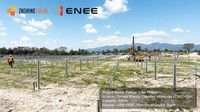In a significant move towards bolstering the solar energy sector in both the United States and Spain, two major companies have recently announced substantial investments aimed at expanding their renewable energy capabilities. OCI Holdings, a South Korea-based firm, is set to invest $265 million to enhance its solar production capacity in Texas, while Masdar, a UAE-based clean energy leader, is advancing its renewable energy initiatives with a notable project in Spain.
OCI Holdings' investment will be funneled through its subsidiary, Mission Solar Energy, which operates a manufacturing campus in San Antonio, Texas. According to a press release dated March 20, 2025, the funds will facilitate the addition of two gigawatts of solar cell production capacity, with expectations to complete the expansion and commence commercial production by the first half of 2026. This project is projected to create approximately 500 jobs, contributing to job growth in the local economy.
The recent announcement comes nearly a year after Mission Solar Energy completed a 200,000-square-foot expansion at its San Antonio facility, underscoring the company’s commitment to growing its domestic footprint. The polysilicon required for the new production will be sourced from OCI Holdings’ chemical subsidiary, OCI TerraSus, based in Malaysia. Furthermore, Mission Solar Energy aims to qualify for the advanced manufacturing production credit and a 10% investment tax credit under the Inflation Reduction Act, enhancing the financial viability of the project.
Texas has increasingly become a hotspot for solar energy projects, ranking second nationally for total installed solar capacity. The state boasts 12,421 jobs in the solar sector and is home to 107 solar manufacturers and 222 solar developers. Recently, T1 Energy announced plans to construct an $850 million, 5-gigawatt solar cell facility in Rockdale, Texas, further indicating the state's growing importance in the renewable energy landscape.
However, the path for solar manufacturers in Texas may soon face challenges due to pending legislation. Lawmakers have introduced a bill that could require renewable energy companies to obtain permits from the Public Utility Commission of Texas prior to construction. This legislation would also mandate environmental impact reviews for wind and solar projects, potentially complicating the development process for new facilities. The Solar Energy Industries Association (SEIA) has expressed concerns, stating, "SEIA and other stakeholders will continue to defend against overly-burdensome siting and permitting legislation," indicating a proactive stance against what they view as restrictive measures.
At the federal level, recent policy shifts have also raised eyebrows. Earlier this month, former President Trump rolled back Biden-era memorandums that supported clean energy initiatives and solar manufacturing, refocusing efforts on fossil fuels. This shift in policy could have implications for the future of solar energy development across the United States.
Meanwhile, across the Atlantic, Masdar is making strides in Spain’s renewable energy sector with the announcement of the Valle Solar project. On March 27, 2025, Masdar, through its Iberian platform Saeta, disclosed a significant investment agreement for the construction of one of the largest solar photovoltaic installations in the Valencia region, with a capacity of 234 megawatts (MW) and a potential Battery Energy Storage Systems (BESS) hybridization of 259 MW.
This ambitious project is expected to be operational in the first half of 2027 and is part of Masdar’s broader goal of achieving a global clean energy portfolio capacity of 100 gigawatts by 2030. The Valle Solar project, originally promoted by a joint venture of Genia Solar Energy and Solar Ventures, represents a strategic move for Masdar as it seeks to expand its footprint in Spain and the Iberian Peninsula.
Valle Solar is positioned as a benchmark for sustainable development, integrating initiatives that support biodiversity and local communities. The project exemplifies a best-in-class model where clean energy production is harmonized with environmental protection and community engagement, reflecting Masdar’s commitment to sustainability and social responsibility.
In addition to its operational goals, the agreement between Saeta Yield, Genia Solar, and Solar Ventures highlights the collaborative efforts necessary for advancing renewable energy initiatives. This partnership serves as a model for future projects, showcasing how clean energy can contribute to both economic growth and environmental stewardship.
Masdar is recognized as one of the world’s fastest-growing renewable energy companies, with a portfolio that spans over 40 countries and a combined capacity of 51 gigawatts. The company aims to be a leading producer of green hydrogen by 2030, further diversifying its clean energy offerings and reinforcing its position in the global market.
As the world increasingly turns its attention to renewable energy sources, the investments by OCI Holdings and Masdar represent significant steps towards a more sustainable future. With Texas solidifying its role as a leader in solar energy production and Spain enhancing its renewable infrastructure, both regions are poised to play crucial roles in the global transition to cleaner energy sources.
In summary, the expansion of OCI Holdings in Texas and Masdar's investment in Spain highlight the growing momentum behind renewable energy initiatives. These projects not only promise job creation and economic growth but also emphasize the importance of sustainability and environmental responsibility in the face of ongoing climate challenges.




